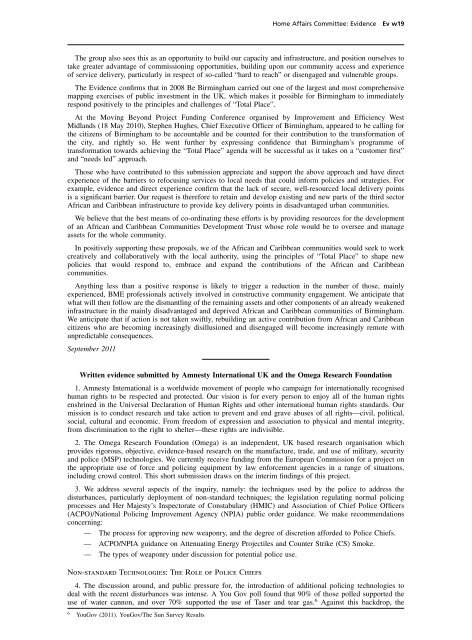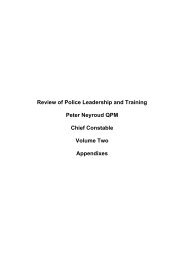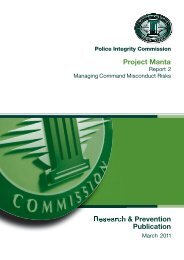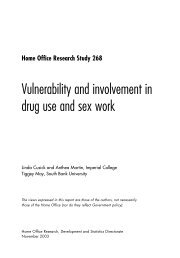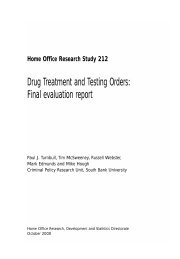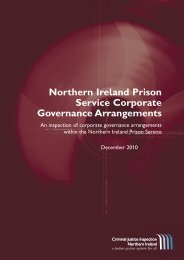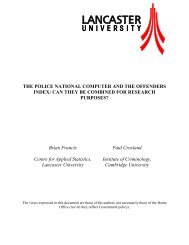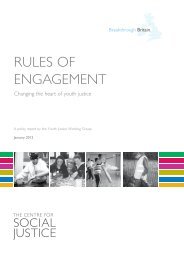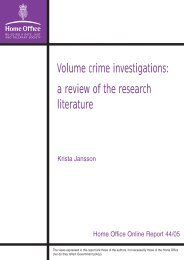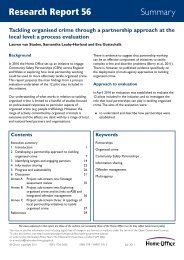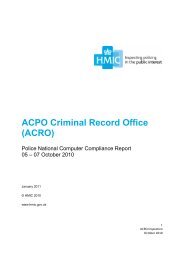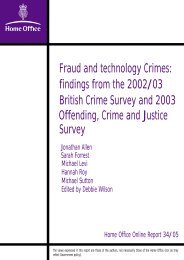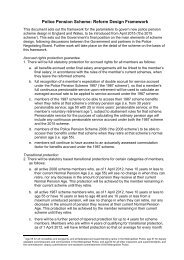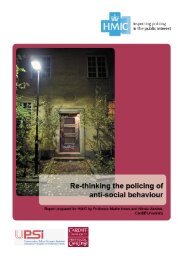Policing Large Scale Disorder: Lessons from the disturbances of ...
Policing Large Scale Disorder: Lessons from the disturbances of ...
Policing Large Scale Disorder: Lessons from the disturbances of ...
Create successful ePaper yourself
Turn your PDF publications into a flip-book with our unique Google optimized e-Paper software.
Home Affairs Committee: Evidence Ev w19<br />
The group also sees this as an opportunity to build our capacity and infrastructure, and position ourselves to<br />
take greater advantage <strong>of</strong> commissioning opportunities, building upon our community access and experience<br />
<strong>of</strong> service delivery, particularly in respect <strong>of</strong> so-called “hard to reach” or disengaged and vulnerable groups.<br />
The Evidence confirms that in 2008 Be Birmingham carried out one <strong>of</strong> <strong>the</strong> largest and most comprehensive<br />
mapping exercises <strong>of</strong> public investment in <strong>the</strong> UK, which makes it possible for Birmingham to immediately<br />
respond positively to <strong>the</strong> principles and challenges <strong>of</strong> “Total Place”.<br />
At <strong>the</strong> Moving Beyond Project Funding Conference organised by Improvement and Efficiency West<br />
Midlands (18 May 2010), Stephen Hughes, Chief Executive Officer <strong>of</strong> Birmingham, appeared to be calling for<br />
<strong>the</strong> citizens <strong>of</strong> Birmingham to be accountable and be counted for <strong>the</strong>ir contribution to <strong>the</strong> transformation <strong>of</strong><br />
<strong>the</strong> city, and rightly so. He went fur<strong>the</strong>r by expressing confidence that Birmingham’s programme <strong>of</strong><br />
transformation towards achieving <strong>the</strong> “Total Place” agenda will be successful as it takes on a “customer first”<br />
and “needs led” approach.<br />
Those who have contributed to this submission appreciate and support <strong>the</strong> above approach and have direct<br />
experience <strong>of</strong> <strong>the</strong> barriers to refocusing services to local needs that could inform policies and strategies. For<br />
example, evidence and direct experience confirm that <strong>the</strong> lack <strong>of</strong> secure, well-resourced local delivery points<br />
is a significant barrier. Our request is <strong>the</strong>refore to retain and develop existing and new parts <strong>of</strong> <strong>the</strong> third sector<br />
African and Caribbean infrastructure to provide key delivery points in disadvantaged urban communities.<br />
We believe that <strong>the</strong> best means <strong>of</strong> co-ordinating <strong>the</strong>se efforts is by providing resources for <strong>the</strong> development<br />
<strong>of</strong> an African and Caribbean Communities Development Trust whose role would be to oversee and manage<br />
assets for <strong>the</strong> whole community.<br />
In positively supporting <strong>the</strong>se proposals, we <strong>of</strong> <strong>the</strong> African and Caribbean communities would seek to work<br />
creatively and collaboratively with <strong>the</strong> local authority, using <strong>the</strong> principles <strong>of</strong> “Total Place” to shape new<br />
policies that would respond to, embrace and expand <strong>the</strong> contributions <strong>of</strong> <strong>the</strong> African and Caribbean<br />
communities.<br />
Anything less than a positive response is likely to trigger a reduction in <strong>the</strong> number <strong>of</strong> those, mainly<br />
experienced, BME pr<strong>of</strong>essionals actively involved in constructive community engagement. We anticipate that<br />
what will <strong>the</strong>n follow are <strong>the</strong> dismantling <strong>of</strong> <strong>the</strong> remaining assets and o<strong>the</strong>r components <strong>of</strong> an already weakened<br />
infrastructure in <strong>the</strong> mainly disadvantaged and deprived African and Caribbean communities <strong>of</strong> Birmingham.<br />
We anticipate that if action is not taken swiftly, rebuilding an active contribution <strong>from</strong> African and Caribbean<br />
citizens who are becoming increasingly disillusioned and disengaged will become increasingly remote with<br />
unpredictable consequences.<br />
September 2011<br />
Written evidence submitted by Amnesty International UK and <strong>the</strong> Omega Research Foundation<br />
1. Amnesty International is a worldwide movement <strong>of</strong> people who campaign for internationally recognised<br />
human rights to be respected and protected. Our vision is for every person to enjoy all <strong>of</strong> <strong>the</strong> human rights<br />
enshrined in <strong>the</strong> Universal Declaration <strong>of</strong> Human Rights and o<strong>the</strong>r international human rights standards. Our<br />
mission is to conduct research and take action to prevent and end grave abuses <strong>of</strong> all rights—civil, political,<br />
social, cultural and economic. From freedom <strong>of</strong> expression and association to physical and mental integrity,<br />
<strong>from</strong> discrimination to <strong>the</strong> right to shelter—<strong>the</strong>se rights are indivisible.<br />
2. The Omega Research Foundation (Omega) is an independent, UK based research organisation which<br />
provides rigorous, objective, evidence-based research on <strong>the</strong> manufacture, trade, and use <strong>of</strong> military, security<br />
and police (MSP) technologies. We currently receive funding <strong>from</strong> <strong>the</strong> European Commission for a project on<br />
<strong>the</strong> appropriate use <strong>of</strong> force and policing equipment by law enforcement agencies in a range <strong>of</strong> situations,<br />
including crowd control. This short submission draws on <strong>the</strong> interim findings <strong>of</strong> this project.<br />
3. We address several aspects <strong>of</strong> <strong>the</strong> inquiry, namely: <strong>the</strong> techniques used by <strong>the</strong> police to address <strong>the</strong><br />
<strong>disturbances</strong>, particularly deployment <strong>of</strong> non-standard techniques; <strong>the</strong> legislation regulating normal policing<br />
processes and Her Majesty’s Inspectorate <strong>of</strong> Constabulary (HMIC) and Association <strong>of</strong> Chief Police Officers<br />
(ACPO)/National <strong>Policing</strong> Improvement Agency (NPIA) public order guidance. We make recommendations<br />
concerning:<br />
— The process for approving new weaponry, and <strong>the</strong> degree <strong>of</strong> discretion afforded to Police Chiefs.<br />
— ACPO/NPIA guidance on Attenuating Energy Projectiles and Counter Strike (CS) Smoke.<br />
— The types <strong>of</strong> weaponry under discussion for potential police use.<br />
Non-standard Technologies: The Role <strong>of</strong> Police Chiefs<br />
4. The discussion around, and public pressure for, <strong>the</strong> introduction <strong>of</strong> additional policing technologies to<br />
deal with <strong>the</strong> recent <strong>disturbances</strong> was intense. A You Gov poll found that 90% <strong>of</strong> those polled supported <strong>the</strong><br />
use <strong>of</strong> water cannon, and over 70% supported <strong>the</strong> use <strong>of</strong> Taser and tear gas. 6 Against this backdrop, <strong>the</strong><br />
6 YouGov (2011). YouGov/The Sun Survey Results


